
Yanka Kupala
State University of Grodno
Displaying items by tag: news
The Faculty of Innovative Mechanic Engineering won the XXV University-wide competition “Alma mater-love from the first year”
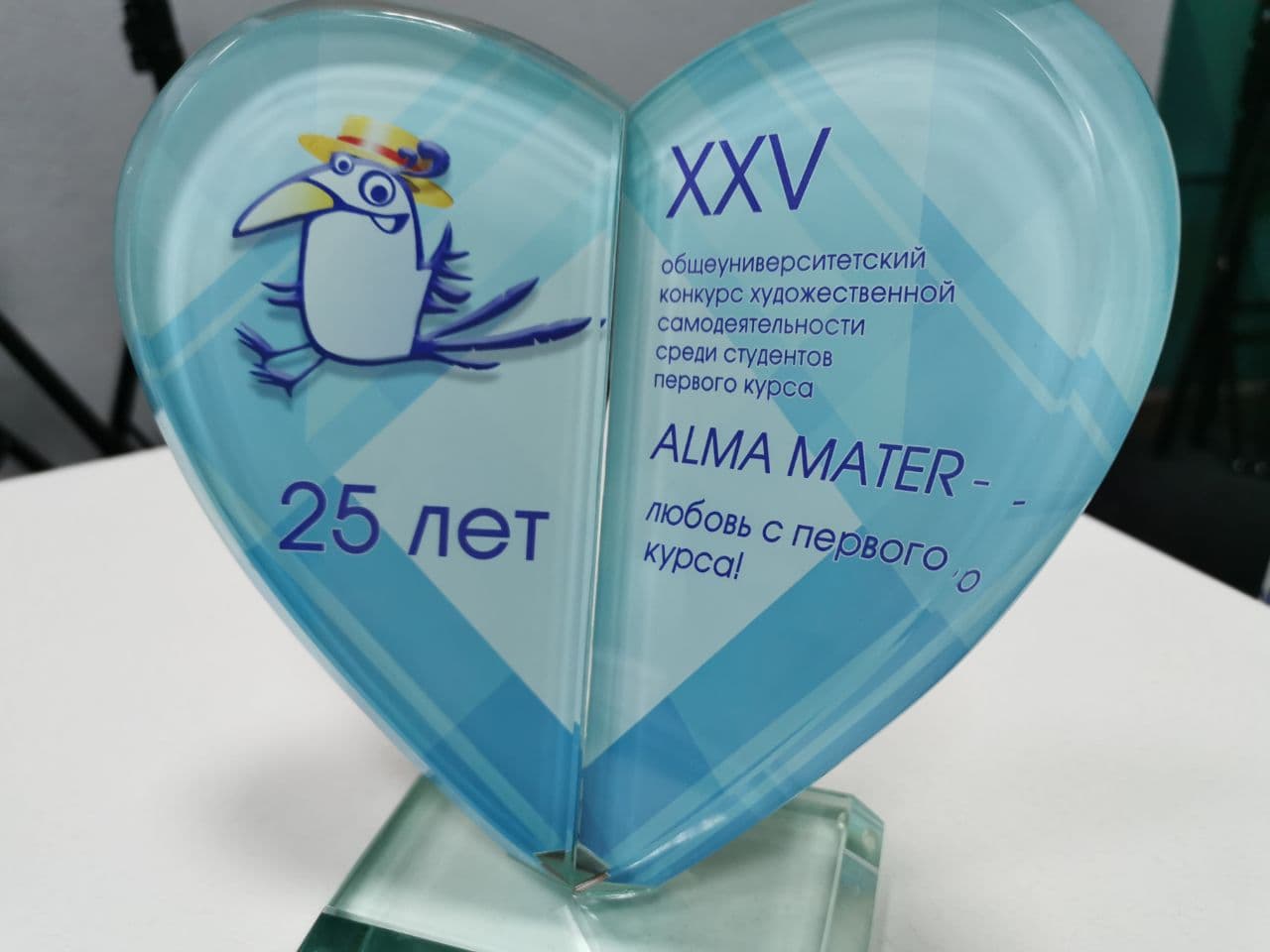
The results of the amateur art competition among freshmen of Kupala University were summed up on the International student's day.
The final of the anniversary competition "Alma mater-love from the first year" was held online for the first time. Representatives of the jury evaluated the participants' performances based on video recordings, after which the results of the competition were announced live.
The winner of the XXV University-wide amateur competition among freshmen was the team of the Faculty of Innovative Mechanic Engineering. The second place was taken by the team of the Faculty of History, Communication and Tourism. And closes the top three - the team of the Faculty of Physical Education.
The best were also named in separate categories. According to the results of the competition, the Faculty of Innovative Mechanic Engineering won in the category "Best project scenario". The main award in the category "Best project direction" is awarded to the Faculty of History, Communication and Tourism. The performance of the Faculty of Economics and Management was noted in the nomination "For loyalty to traditions". "For many years of contribution to the development of the project," it was decided to award the Faculty of Philology of Yanka Kupala State University. The team of freshmen of the Faculty of Engineering and Construction was recognized as the "Breakthrough of the year". As the best vocal group of the project marked the Faculty of Biology and Ecology, best vocal ensemble of the project was the team of the Faculty of Mathematics and Informatics, as the best dance team of the Faculty of History, Communication and Tourism. The best choreographic number was prepared for the competition by freshmen of the Faculty of Law, and the team of the Faculty of Arts and Design was recognized as the winner in the category "Best original genre number".
The winners among the contest participants in personal categories were also determined. Student of the Faculty of Engineering and Construction Dmitry Vasyukevich became the winner in the nomination "The main attraction", student of the Faculty of Innovative Mechanic Engineering Nikita Nichipor – in the nomination "Best male role", the student of Faculty of Physical Education Nikita Lukashov – in the category "Best male role of the second plan", student of the Faculty of Pedagogy Ksenia Laguta – in the category "Best female role of the second plan" and a cadet of the Military Faculty of Yanka Kupala State University of Grodno Dmitry Ksiongik was marked as the best vocalist of the project.
Awards to the winners will be presented on November 26 at the Council for Ideological and Educational work
Andrey Dunko presented Yanka Kupala State University at the regional stage of the contest " Student of the year – 2020»

The final of the regional stage of the competition was held in the concert hall of the Grodno city house of culture on November 12.
Supported by a standing ovation from their support groups, 3 active and initiative students claimed the title of the best in the region on the stage that day. This is a 2nd year student of the Faculty of Philology of Yanka Kupala State University of Grodno Andrey Dunko, 2nd year student of Engineering-Technological Faculty of Grodno State Agrarian University Olga Furman, and 5-year student of the Medical Faculty of Grodno State Medical University Anastasia Hliupina. Earlier, the students won local tours that were held at three universities in Grodno.
The jury consisted of Secretary of the Central Committee of the Belarusian Republican Youth Union Yulia Zinkevich, second Secretary of the Grodno Regional Committee of the BRYU Andrey Esin, winner of the regional stage of the contest "Student of the year-2019" Artem Nesteruk, editor of the TV and radio company "Grodno" Yulia Novikova and Head of the Department of Organizational and Public Work of the Grodno Regional Association of Trade Unions Nadezhda Stepuro.
As part of the first contest, which was traditionally called "visit card", the students talked about their hobbies and achievements, and plans for the future. In the public speaking contest, participants demonstrated their skills in public speaking. A teacher, a doctor, a technology engineer-future professionals in various fields shared their thoughts about the chosen professions with the jury and the audience. The next stage of the competition was the video contest "I am a student/Uni", after which the jury was able to ask the participants a few questions, evaluating the erudition of the students and their ability to stay on stage during the intellectual competition.
The competition marathon ended with bright and creative performances, during which the contestants sang, danced, and recited poems.
Anastasia Hliupina, a student of Grodno State Medical University, became the "Student of the year – 2020" within the regional stage of the competition. The girl will represent the Grodno Region in the final of the competition in Minsk. The winner in the category "Student of the year – 2020 online" was a representative of Grodno State Agrarian University Olga Furman. By the way, the best support group was also recognized as the team of this university.
Yanka Kupala State University will host the olympiad "Ecology of the Neman Euroregion”
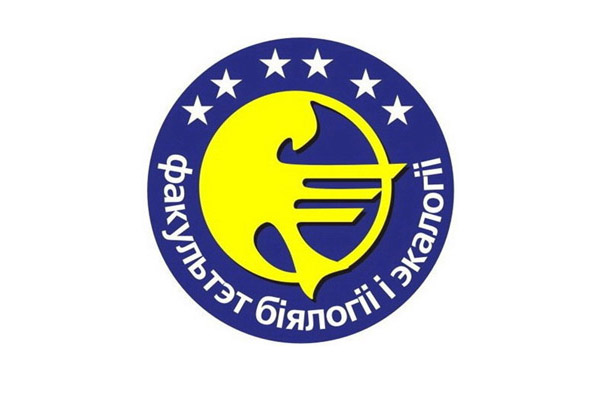
Students of non-biological specialties of Kupala University are invited to take part in the olympiad.
The organizer of the olympiad "Ecology of the Neman Euroregion" is the Faculty of Biology and Ecology of Yanka Kupala State University. The environmental olympiad involves two rounds: theoretical and practical. At the first stage, participants will have to complete about 70 test tasks. In the second round, students will be asked to perform practical work on the topic "Environmental friendliness of consumer products" with subsequent justification of the results obtained. The winners will be determined by the highest number of points scored at the end of two rounds in the individual and team competition.
The olympiad will be held on November 17 at 15.00 in the academic building at the address: per. Dovator, 3/1, AUD. 8. registration of participants is currently ongoing. Each faculty can be represented by a team of 5 people. Applications for participation are accepted by the Department of Ecology by phone number 48 50 01.
Yanka Kupala State University students reached the semifinals of the international student programming olympiad

For the first time Kupala University will be represented by two teams in the semifinals of the ICPC international Collegiate Programming Contest.
On November 14, Belarusian State University hosted a team programming championship competition among higher education institutions in Belarus and the Baltic States. At the same time, for participants from Belarus, Kaliningrad and Latvia, these competitions were the selection (quarterfinals) of the ICPC student team world championship – Belarus and Baltics Regional Contest 2020 (XXIII NERC Western regional contest). In the quarterfinals, students were asked to solve 12 algorithmic problems in 5 hours. The victory was awarded to the team that solved the most problems in the shortest time.
Yanka Kupala State University of Grodno was represented by three teams of students from the Faculty of Economics and Management and the Faculty of Mathematics and Informatics. All Kupala students train under the guidance of senior lecturer of the Department of Mathematical and Information Support of Economic Systems, Faculty of Economics and Management Yuri Stepin.
Two teams of our University won the right to play in the semifinals, which will be held on December 13. Previously, only the teams of Belarusian State University and the Belarusian State University of Informatics and Radioelectronics had the opportunity to represent a higher educational institution of Belarus in the semifinals with more than one team.
A total of 71 teams from 16 higher education institutions in Belarus and the Baltic States took part in the competition. Only 14 of them reached the semifinals, which will be held in December this year in St. Petersburg. The championship final will be held in the fall of 2021.
The winners of remote olympiads in Chemistry and Biology among schoolchildren were determined at Yanka Kupala State University

More than 500 schoolchildren from different regions of Belarus took part in the olympiads.
Remote olympiads in Chemistry and Biology among students in grades 9-11 were held at the faculty of biology and ecology from October 26 to November 5. They were held with the aim of developing students' interest in biological and chemical knowledge, scientific activities, increasing their creative activity, as well as creating the necessary conditions for professional orientation and continuing education of talented and gifted young people at the University. Each olympiad was held in three stages and included closed test tasks of varying complexity – the website http:/school.grsu.by was used for this purpose. At the first stage of the remote biology olympiad, students completed tasks in Botany and Zoology, at the second stage – in Anatomy, Physiology and Biochemistry, and at the third stage – in the Theory of Evolution and Ecology. The remote Chemistry olympiad included tasks in General, Inorganic, and Organic Chemistry. The winners of each olympiad were the students who scored the maximum number of points based on the results of three stages. All participants of the olympiads will also receive an invitation to the open days of the Faculty of Biology and Ecology of Kupala University, where children will be able to get acquainted with educational laboratories and attend entertaining master classes "Chemical assessment of natural environments" "Microorganisms around us", "Green consumption".
Yanka Kupala State University hosts “PROF holidays” for high school students for the first time
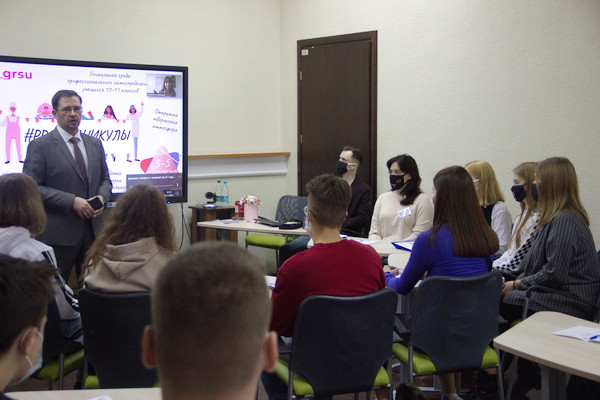
62 students of secondary schools and gymnasiums in Grodno, Slonim, Shchuchin and Skidel joined vocational guidance intensive courses from 3 to 5 November.
The project "PROF-holidays" started with a video conference, during which experts – representatives of various companies who have successfully implemented themselves in the profession-got in touch with the children. They shared their experience and opinions about what professions will be in demand in the future and what professional skills need to be developed today.
– We want to help our potential applicants take another confident step in the direction of choosing a profession, - said the Dean of the Faculty of Pre-University training of Yanka Kupala State University, Iosif Dornyak, opening the career guidance intensive course. – The goal of the project "PROF-holidays" is not to offer applicants a particular specialty, but to create conditions for them to develop soft skills and hard skills as future professionals. The University has accumulated a wealth of experience in terms of resources and intellectual base, we have a very strong practice-oriented component of the educational process, so I think our new project will be implemented successfully.
The program of the second day of the intensive course included visiting the Faculties of Kupala University. By the way, each of the project participants had the opportunity to decide in advance on the choice of the faculty and the direction they were interested in. So, an eleventh-grader from Skidel Polina Poleshuk has already decided that she wants to become a designer and therefore is looking forward to visiting the faculty of arts and design.
– Our school teachers offered me to take part in the project "PROF-holidays", and I found it very interesting. After all, choosing a profession is a very important stage in every person's life. Moreover, I have already decided: I am going to enter Kupala University at the Faculty of Arts and Design, I want to study in graphic Design, - Polina Poleshuk said.
But Maksim Kozich, who is studying in the final year of gymnasium No. 2 in Grodno, has not made a final choice yet and expects that the "PROF-holidays" will help him decide on the faculty and specialty. In any case, Maxim is going to apply for admission to Yanka Kupala State University next year:
– I choose between two areas – electronic marketing and programming. During the "PROF-holidays" I plan to visit both the faculty of mathematics and computer science, and the faculty of Economics and management. I want to learn more about each of the specialties that interest me and make a final choice.
Students of 20 educational institutions from different cities of the region joined the project. As part of the career guidance intensive, potential applicants will visit 8 Faculties of Yanka Kupala State University. The project participants will be offered various formats of events, including business quizzes, training sessions, team games and creative workshops. The results of the first career guidance intensive organized by Kupala University for high school students will be summed up on November 5 at a round table.
Yanka Kupala State University continues to implement the project "Give yourself without a trace»

During the academic year Kupala University will host a marathon of charity events as part of the project.
This month, thematic events dedicated to the world day of kindness and the International day of tolerance will be held at the Faculties of Law and Pedagogy. In December 2020, the Faculty of Biology and Ecology is planning to hold an action "Stop HIV/AIDS". Traditionally, in December and January, Kupala University volunteers, staff and students of all Faculties will join the Republican New Year's charity event "Our children".
Throughout the academic year, the "Give yourself without a trace" project will provide assistance to veterans of the great Patriotic war, veterans of University labour, and lonely elderly people. Volunteers will take care of places of memory, as well as initiate actions to restore order in the city and region. It is also planned to conduct training sessions for members of the University's Volunteer centre, aimed at the formation and development of competencies necessary for successful volunteer activities.
The project "Give yourself without a trace" has been implemented at Yanka Kupala State University since 2016 with the aim of coordinating and activating youth initiatives, educating students of high moral qualities by involving young people in solving socially significant problems. Among the main directions of the project are assistance to veterans, lonely elderly people, people with disabilities, orphans and children left without parental care, as well as assistance to homeless animals, environmental protection and promotion of a healthy lifestyle. The project "Give yourself without a trace" is implemented by the Council of Volunteers of Kupala University.
The first stage of rehearsal testing takes place at the Yanka Kupala State University
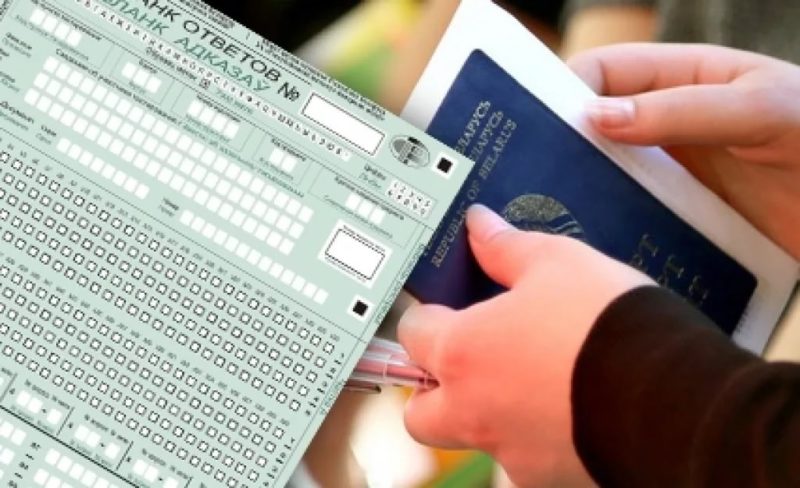
Students of the Grodno region will be able to test their knowledge in the first stage until December 10.
At Yanka Kupala State University, where rehearsal testing is taking place, those who wish have already written about two thousand tests and are actively continuing to register. The most popular subjects are Russian, Mathematics, English, and History of Belarus. By the way, some applicants use the fact that RT provides two options for each subject, and write the test twice.
Testing on the basis of Yanka Kupala State University takes place every day except Thursday. Registration ends two days before the day of testing for the subject. The number of seats for each day is limited, but you can always choose a different convenient date.
– The most important thing is that RT allows you to check your knowledge, fill in and systematize it, and eliminate the gaps found. When applicants participate in the second or third stage of testing, they see how the result changes. This is a good tool for self-monitoring and preparation for CT, - says Irina Shinkevich, Deputy Head of the Regional Centre for Testing and Career Guidance for Young People.
You can take part in the first stage of testing both in Grodno and in regional centers. In addition, the online format is available on the website of the Republican Institute of Knowledge Control.
You can see your results in your personal account in ten days from the date of writing the test. In addition to the overall score, applicants will be able to see which tasks were completed incorrectly. Also, after December 20, comments on all test tasks will be posted in your personal account with correct answers and necessary explanations or ways to solve them.
A training seminar for heads of student groups was held at Kupala University
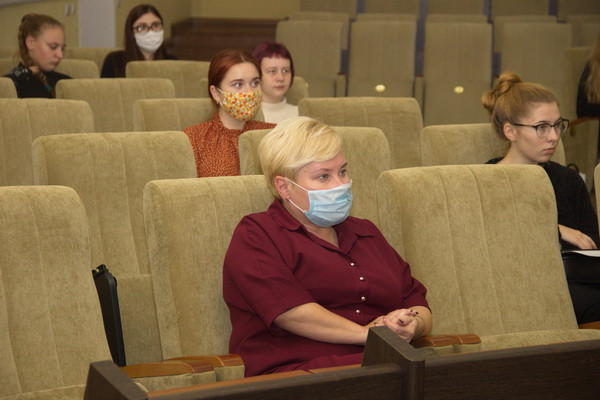
The traditional annual meeting was attended by first-year heads of student groups of the University's Faculties.
At the beginning of the event, Vice-Rector for Educational Affairs Vasiliy Sianko addressed the participants. He noted that the mission of the headman today is to be a link between the Dean's office of Faculties, Departments, other structural divisions of the University and students of groups, and successful interaction with each Kupala student depends on their systematic and responsible work.
During the meeting the heads of the first-year study groups discussed the work plan for the current academic year and talked about the structure of the University's Council of heads of student groups. Also, the head of the Centre for Personnel and Legal Work of Galina Sakomskaya told the students about the legal aspects of activity of heads of educational groups, and head of the Department of Cultural and Leisure Activities Elena Stelmakh and facilitator for physical improving and sports-mass work of Sports Club Marina Yasene talked about the role of heads of heads of student groups in the organization of extracurricular activities of students.
At the end of the training workshop, participants were divided into two groups to attend a master class on public speaking and training on leadership development and successful communication skills.
The next graduation of foreign master’s degree students took place at the Faculty of Biology and Ecology of Yanka Kupala state University of Grodno
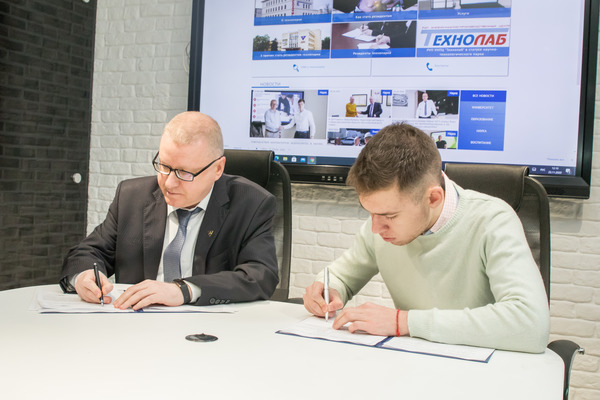
Master's degrees were awarded to 18 foreign citizens from Iraq who completed their studies at the second stage of higher education at Yanka Kupala state University of Grodno.
All graduates are citizens of Iraq, who were awarded diplomas in the fields of "Biochemistry "and" Biology" as a result of successful defense of master's theses. The defense of theses was held at the Department of Biochemistry as part of the work of the State Examination Commission chaired by the lead researcher of the “Institute of Biochemistry of Biologically Active Compounds of the National Academy of Sciences of Belarus”, PhD professor in biological sciences, Elena Sutko.
The graduation of foreign master’s degree students, which took place at the Faculty of Biology and Ecology of Yanka Kupala state University of Grodno, on November 19, was the largest in number. In total, over the past few years, more than 40 Iraqi citizens who studied at the second stage of higher education at Kupala University have received master's degrees. Currently, 25 foreign citizens study at the Faculty of Biology and Ecology in the master's degree program.





































